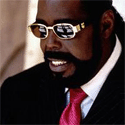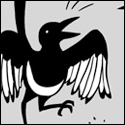|
Cardiovorax posted:The obvious counter-question would be "why would you expect her to be able to do that?" Has the character done anything to make that a reasonable question? My point is, the author obviously needs to have a clear idea of what their characters are capable of, but they shouldn't have to tell us that. It should be implicit in what they show the character actually doing. I understand your point. You don't like magic systems that explain everything. I personally define magic as anything that is caused to happen contrary to known physical reality. Like princes don't turn to toads. The dead remain dead. A rose doesn't give forth buttercups. Spring flowers growing outdoors don't bloom in the middle of winter. But we have an entire body of fairy tales that suggest these things can happen, under the guise of "magic". If I am told that the character can do "magic", I am prepared for just about anything. So my point, which you are missing entirely, is that in order for magic to "work" in a story, it has to have some kind of limitation. Otherwise you just have a godlike being who waves a hand and gets whatever s/he wants. I then described some of the ways that magic could be limited. I get it already, you don't like the physics of magic style, but it's a valid approach. So is the idea of "balance" in the universe that magic must not disturb, or that one can only use one's powers in certain ways, or whatever. When I posted, I confess I hoped that other people might post about other ways magic can be limited and avoid the whole limitless power trap. All of the different methods are valid, no matter which method you prefer.
|
|
|
|

|
| # ? May 9, 2024 23:59 |
|
Cardiovorax posted:The need to constantly explain everything basically a symptom of that world builder's disease where authors forget to write an engaging story over making up a setting for the story to happen in. The magic is a backdrop, it's a conceit of the genre to enable a certain kind of plot. It shouldn't be the whole point. I can definitely understand that viewpoint, but I don't think I agree with it in regards to Sanderson (whom I believe we're still discussing). I feel his stories are plenty engaging, and the rigid magic system is something I enjoy on top of that.
|
|
|
|
Zola posted:I understand your point. You don't like magic systems that explain everything. You're completely missing what he said. Of course every magic system will have limits. The point is that if the only way the author can get the reader to understand the limits is to do an infodump a la Sanderson, they are doing a really poor job. Cardiovorax said this, "My point is, the author obviously needs to have a clear idea of what their characters are capable of, but they shouldn't have to tell us that. It should be implicit in what they show the character actually doing." He's talking about writing well vs writing poorly, not what kind of magic he thinks is cool. sourdough fucked around with this message at 21:00 on Mar 12, 2014 |
|
|
|
RVProfootballer posted:Of course every magic system will have limits. It's fair for two people to disagree on whether or not they like their magic mysterious or explained, but the argument doesn't seem to be "I don't like explained magic systems", but rather instead "the writing/story is bad if the magic system is explained", which is the sentiment I myself object to. syphon fucked around with this message at 21:13 on Mar 12, 2014 |
|
|
|
Sometimes I like a pulpy series that has the magic system as it's main focus and driving force, but in general I do prefer when it's just one of many cool elements in the setting and doesn't have all it's mechanics meticulously mapped out. I'd say Sanderson falls into the magic system pulpy fantasy category, it's enjoyable but isn't gonna break any real new ground writing wise.
savinhill fucked around with this message at 21:18 on Mar 12, 2014 |
|
|
|
syphon posted:I don't think this is necessarily true, and would flip the statement around. One sign of bad fantasy writing (IMO) is when there are no obvious or implied limits to what magic can and can't do, so it's used inconsistently to solve problems. The trope/meme 'A wizard did it' came about for a reason, after all. It's just like any other thing the author could explain. Don't write, "Bob met Joe. Joe was super strong, liked to drink beer, always saw the bright side to a situation, and was good with swords." That is a bad way to write. Instead, have Bob and Joe do some stuff, where Joe lifts a beer barrel to pour beer into his mouth, has cheery retorts when something bad happens, fights people with a sword, etc. Sanderson can have a super rigid magic system and that's fine, but if literally the only way he can get the reader to understand the system is to write, "the magic system has spells called Lashings, it has mana called stormlight, doing x uses more stormlight than doing y," that is poor writing. That is all anyone is objecting to, that I can see. Preferring mysterious or rigid magic systems is just a preference, but neither type of system excuses bad writing.
|
|
|
|
syphon posted:I don't think this is necessarily true, and would flip the statement around. One sign of bad fantasy writing (IMO) is when there are no obvious or implied limits to what magic can and can't do, so it's used inconsistently to solve problems. The trope/meme 'A wizard did it' came about for a reason, after all. Thank you, that's exactly what I was saying. My post had nothing to do how well an author did or didn't write a magic system. My post was about how magic had to have limits otherwise there wasn't much to write a story about, and I listed some of the ways that I have seen various authors handle the need for limits.
|
|
|
|
RVProfootballer posted:It's just like any other thing the author could explain. Don't write, "Bob met Joe. Joe was super strong, liked to drink beer, always saw the bright side to a situation, and was good with swords." That is a bad way to write. Instead, have Bob and Joe do some stuff, where Joe lifts a beer barrel to pour beer into his mouth, has cheery retorts when something bad happens, fights people with a sword, etc. Sanderson can have a super rigid magic system and that's fine, but if literally the only way he can get the reader to understand the system is to write, "the magic system has spells called Lashings, it has mana called stormlight, doing x uses more stormlight than doing y," that is poor writing. That is all anyone is objecting to, that I can see. Preferring mysterious or rigid magic systems is just a preference, but neither type of system excuses bad writing. I used the example of Gandalf not because I think that Tolkien is categorically superior, but because it's a good illustration. Think of how much less meaningful that scene would have been if Tolkien had told us in excruciating detail how Gandalf is totally swole, but his boss told him not to use his full power, so the Balrog will totally spank him. It's just so much less compelling in every sense.
|
|
|
|
Cardiovorax posted:In fiction like Branderson's, where every capability is detailed up-front and there's a clear "who can beat up who" pecking order, there's so much less tension in conflicts, because it's a lot easier to predict who is going to come out on top in any match-up. I'm mostly on your side in this discussion and tend to prefer less explicitly mechanistic writing but I don't agree with your evaluation here. I like Brandon Sanderson and I think his books are very entertaining to read. Also agree that his writing ability is just OK. In a recent discussion with a friend we agreed that Sanderson puts more emphasis on writing something cool than something good - but it's OK, because it's cool, you just have to have the correct expectations. To me, the dramatic tension and fun and cool factor of mechanistic, clearly defined magic systems like this comes from the character's applications of their explicitly spelled out and limited powers. In fiction like Sanderson's, every capability is detailed up front and there is a clear "who should beat who" pecking order - the fun of the book comes from the MC figuring out how to use his clearly defined powers in a more creative way than his opponent expects, therefore upsetting the pecking order. In Sanderson's books, his characters are often clearly less powerful than some of the opponents they face, and everybody expects them to lose. But they overcomes challenges by using their powers more creatively and doing new things with limited resources. It's the characters' ingenuity that makes them interesting.
|
|
|
|
Cardiovorax posted:Right. I'm not talking about what I think of mechanistic systems, although I don't like them personally, but of how I think information about them should be revealed. For one, because it breaks a rule as basic as "show, don't tell" and for the other because I think that it limits the dramatic potential of conflicts between characters. In fiction like Branderson's, where every capability is detailed up-front and there's a clear "who can beat up who" pecking order, there's so much less tension in conflicts, because it's a lot easier to predict who is going to come out on top in any match-up. I'm sorry but I don't think you know what you are talking about. First of all, you are generalizing an entire group of fantasy writers from one single author. Second, you are utterly and completely wrong about the statement that Sanderson explaining his magic decreases tension in the conflicts. It's exactly the opposite as has been explained very well earlier in the thread and in his blog post about this. Third, you are also wrong in the statements "every capability is detailed up-front" (some are, some are not) and in the statement that there's a pecking order (edit: in the sense that characters beat stronger characters often). For reference, blog post: http://brandonsanderson.com/sandersons-first-law/ Anyway, I'll start with saying that I agree that Sanderson writes bad prose sometimes, especially when explaining magic system. The explanation is often badly written. That's besides the point here though since it does not mean it can't be well written. It does not limit the dramatic potential of conflicts because if these limits are not obvious it means that you end up with characters suddenly using magic never expected of them, i.e. deus ex machina solutions. The arguement is that the more you want to use magic in the conflicts, the better the readers should understand what's possible and what is not (implicitly or explicitly), because surprising the readers with magic abilities they could not expect where possible you will lose your audience. Conversly, you do not have to explain to your readers (implicitly or explicitly) what is possible, but if you don't you should refrain from using magic often. In fact, pretty much all fantasy authors follow this strategy. I honestly can't think of a single good fantasy book in which you have a mysterious/mystique magic system (like Tolkien) in which that magic is also often used in conflicts. This is really not controversial at all. The specific statements about Sanderson you got wrong are kinda irrelevant to this discussion since we should not generalise all fantasy writers using mechanical magic systems from him. quote:I used the example of Gandalf not because I think that Tolkien is categorically superior, but because it's a good illustration. Think of how much less meaningful that scene would have been if Tolkien had told us in excruciating detail how Gandalf is totally swole, but his boss told him not to use his full power, so the Balrog will totally spank him. It's just so much less compelling in every sense. It is not a good illustration since you really can not compaire Sanderson and Tolkien like that. They aim to do completely different things with their books and although you are correct that LotR would be much worse with a mechanical magic system, you are forgetting that this is irrelevant because Sanderson's books would be impossible without one. They are honestly different kinds of books with different aims. To go away from Sanderson, imagine that there had been no implicit/explicit limitations in Harry Potter's universe and every single fight you'd end up seeing completely new spells (oh, magic portal under your feet connected with the moon, next fight change all air into water and suffocate somebody, next fight put everybody to sleep) that you could not expect to be possible. It would severely limit the dramatic potential of conflicts between characters because you would know that anytime the writer wants it she could write in a new spell that suddenly resolves the conflict. There would be no tension because you would never know if a character is in a hopeless situation, in fact, you would never know if a character is in a losing position. All magic using conflicts would degrade in an utterly confusing mess where anything is possible. If you can think of an example of a good fantasy novel in which magic is used often in conflicts yet is utterly mysterious/unimaginable/unbounded, I'd like to read it. Walh Hara fucked around with this message at 22:42 on Mar 12, 2014 |
|
|
|
Walh Hara posted:If you can think of an example of a good fantasy novel in which magic is used often in conflicts yet is utterly mysterious/unimaginable/unbounded, I'd like to read it. This isn't really the opposite position, though. The opposite position is numinous magic, which works on narrative, emotional, or resonant logic - not a hard set of rules but a feeling of how things should be, what the costs are, who pays and why. 'The power of love' is a really basic, trite example of numinous magic. The way the elves guard their lands in the Lord of the Rings is another example: orcs don't go there, they are turned back, but there's no explicit wall of force or circle of protection vs. orc. Earthsea is one of the easiest numinous systems to point to. The books are all about magic and its rules and costs and logic, but not once is the magic made mechanistic.
|
|
|
|
Yeah, there really isn't a pecking order for Brandon Sanderson's magic - I mean there's obvious differences in power such as god vs mortal or Mistborn vs Misting, but that's no different than 'expert swordsman' vs 'untrained peasant', and if you have two Mistborn chances are they are close to equals in power, and any fight that may happen is entirely decided by skill/cleverness instead of some arbitrary power level. A misting that can Push and a misting that can Riot aren't in a 'pecking' order either - their powers do a useful thing and aren't ranked as a 'better' or 'worse' power. Hell, if you want to talk about 'pecking order', numinous magic systems can do that all the time too - see the quintessential example : Dragon Ball Z power levels - that's a magic system, it's numinous not mechanistic, but victory or defeat is determined by some arbitrary magic number. Stereotypical wizards in fantasy can just have 'magic battles' that are arbitrarily decided by which wizard is more powerful, instead of an actually interesting fight. Bad magic fights are't inherent to either style.RVProfootballer posted:It's just like any other thing the author could explain. Don't write, "Bob met Joe. Joe was super strong, liked to drink beer, always saw the bright side to a situation, and was good with swords." That is a bad way to write. Instead, have Bob and Joe do some stuff, where Joe lifts a beer barrel to pour beer into his mouth, has cheery retorts when something bad happens, fights people with a sword, etc. Sanderson can have a super rigid magic system and that's fine, but if literally the only way he can get the reader to understand the system is to write, "the magic system has spells called Lashings, it has mana called stormlight, doing x uses more stormlight than doing y," that is poor writing. That is all anyone is objecting to, that I can see. Preferring mysterious or rigid magic systems is just a preference, but neither type of system excuses bad writing. Fortunately the only time I can think of Sanderson being completely, truly, entirely terrible in that regard is the beginning of Way of Kings (which is what everyone is quoting), which was a big screwup on his part, and even I cringed at it, and I'm a big fan of his. Most of the time the discovery of the magic in his world often ends up flowing out a bit more naturally, especially as the main characters are often pioneers discovering the rules for themselves for the first time instead of having anyone to actually explain it to them. Hell, even in Way of Kings/Stormlight, a lot of the stuff that you see in Szeth's prologue is just so much nonsense without any context or real understanding, just terms that have been thrown out without explanation, and you end up discovering it all over again for real through the actual story. Stormlight is 2 books in and it feels like we've barely touched the tip of the iceberg of how it really works, it's all very mysterious, it's just internally consistent and following rules that nobody actually knows yet, but could be figured out with logic/experimentation. Part of the appeal of his books is sort of figuring out the underlying mystery of the whole world and it's magic, as well as the actual conflict itself, though both things often end up becoming one and the same - the conflict in the story is completely intertwined with his magic, and understanding more rules of his magic can suddenly reveal massive plot twists with the actual conflict in the story without it feeling like it was pulled out of his rear end, especially as he foreshadows and leaves hints everywhere - You can reread Mistborn 1 and 2 after reading three and suddenly a whole lot of seemingly insignificant little details all add up inevitably to foreshadow what happens in book 3. Wolpertinger fucked around with this message at 09:19 on Mar 13, 2014 |
|
|
|
General Battuta posted:This isn't really the opposite position, though. The opposite position is numinous magic, which works on narrative, emotional, or resonant logic - not a hard set of rules but a feeling of how things should be, what the costs are, who pays and why. 'The power of love' is a really basic, trite example of numinous magic. The way the elves guard their lands in the Lord of the Rings is another example: orcs don't go there, they are turned back, but there's no explicit wall of force or circle of protection vs. orc. Other good authors using a numinous system are grrm, Abercrombie, Lynch, Valente, Clarke, etc. Numinous magic systems are probably more common than mechanical ones anyway, there's no shortage of good examples of them. I was merely refuting the claim/opinion that mechanical magic systems limit the potential conflict between characters.
|
|
|
|
Wolpertinger posted:Hell, if you want to talk about 'pecking order', numinous magic systems can do that all the time too - see the quintessential example : Dragon Ball Z power levels - that's a magic system, it's numinous not mechanistic, but victory or defeat is determined by some arbitrary magic number. How does dragonball z qualify as numinous exactly? It's corny kid's anime but its system of power levels is defined and consistent as far as I remember(disclaimer I watched a lot of this show as a child), with the constraint that every new bad guy has to be orders of magnitude more powerful than the previous one, because goku has to beat one and immediately lose to the next. The sources of power are either technology or spirit energy cultivated by martial arts training and the techniques they use are basically just progressively instanced versions of move really fast, punch a dude really hard, fly, shoot an energy bolt, teleport. The enumerated power level thing was a throw away line pretty much.
|
|
|
|
Walh Hara posted:I'm sorry but I don't think you know what you are talking about. First of all, you are generalizing an entire group of fantasy writers from one single author. Second, you are utterly and completely wrong about the statement that Sanderson explaining his magic decreases tension in the conflicts. It's exactly the opposite as has been explained very well earlier in the thread and in his blog post about this. Third, you are also wrong in the statements "every capability is detailed up-front" (some are, some are not) and in the statement that there's a pecking order (edit: in the sense that characters beat stronger characters often). I am somewhat loathe to wade into this rather acrimonious debate, but I get the sense through most of the Malazan series that the true limits of magic and the way it interacts with the world are pretty much incomprehensible to most players, but magic is constantly used to resolve conflict. It's a bit of a grey area as there's some definition around warrens and how those limit a mage's power, but those limits are routinely broken and the holds somehow play into it and gods and statues and So that's one, in my opinion anyways.
|
|
|
|
andrew smash posted:How does dragonball z qualify as numinous exactly? It's corny kid's anime but its system of power levels is defined and consistent as far as I remember(disclaimer I watched a lot of this show as a child), with the constraint that every new bad guy has to be orders of magnitude more powerful than the previous one, because goku has to beat one and immediately lose to the next. The sources of power are either technology or spirit energy cultivated by martial arts training and the techniques they use are basically just progressively instanced versions of move really fast, punch a dude really hard, fly, shoot an energy bolt, teleport. The enumerated power level thing was a throw away line pretty much. In the sense that how it exactly works or who can do what or even how you raise this magic number that determines the strength of everything you do is pretty much undefined other than 'train hard and scream a lot'. I guess it's too simplistic for it to be a good example either way. I dunno, I guess it might have been a bad example due to how ridiculously simple it is.
|
|
|
|
Wolpertinger posted:In the sense that how it exactly works or who can do what or even how you raise this magic number that determines the strength of everything you do is pretty much undefined other than 'train hard and scream a lot'. I guess it's too simplistic for it to be a good example either way. I dunno, I guess it might have been a bad example due to how ridiculously simple it is. Not really. Numinous systems, by definition, are simplistic in terms of how they work. 'The power of love' or 'The beauty of the elves' or whatever else is just as wishywashy and ill defined as your DBZ power level. Mechanistic systems, on the other hand, work due to logical rules and order. The guy with a power level of 3000 won't always beat the guy with the power level of 1000, because so much of the system is exploitable due to the fact that it has logical rules. Numinous systems just have the stronger person win due to their 'power level' whether it be Ainu juice, or elven strength, or whatever else, they win because the author says so, end of story. Mechanistic systems require actual reasoning during a contest of any sort, that's the main difference.
|
|
|
|
nucleicmaxid posted:Not really. Numinous systems, by definition, are simplistic in terms of how they work. 'The power of love' or 'The beauty of the elves' or whatever else is just as wishywashy and ill defined as your DBZ power level. Do you mean like how former enemies could work together, using strategy and sacrifice, to overcome a more powerful alien invader? That kind of actual reasoning? 
|
|
|
|
This is a neat conversation and I'm curious what you guys think of the furies in the Codex Alera series. I really liked that system, and one of the things I liked is that the furies of people in urban areas manifested as the plain form of the element (kind of like waterbending) while the furies of people in rural areas formed into recognizable shapes (like an earth fury dog) with names. I just finished listening to The Martian by Andy Weir, it's about an astronaut that gets left for dead during the 3rd manned mission on Mars. It's pretty great and viewpoints alternate between the astronaut's sardonic Kraps fucked around with this message at 00:13 on Mar 14, 2014 |
|
|
|
I just finished The Emperor's Blades by Brian Stavely. It's the start of a new Epic Fantasy Trilogy™ and also the debut of a new author. Just came out in January 2014. I think Stavely is going to be a big name to watch out for in the fantasy world. The book's gotten pretty overwhelmingly positive reviews. It's doesn't break much ground; most of the situations and characters are pretty standard fantasy tropes. However, Stavely shows that if a book is well written, it doesn't have to be innovative for the sake of novelty. He executes so drat well that the book is tremendously enjoyable from start to finish. It's well paced, the world is cool and immersive (there are some really awesome terrible monsters), the characters are compelling, and the quality of the prose is way above the standards of the genre. The book follows three POV characters, the three children (two boys and a girl) of an emperor who has just been assassinated in a mysterious conspiracy. The children have been separated in far-flung corners of the world for the past 8 years. The daughter has lived at court, learning the arts of political intrigue and pouting. The elder son/heir is doing the Padawan thing at ye olde Zen Mountain Monastery, while the younger son is finishing up his last year of Hogwarts/Battle School/SEAL training. Each of the kids has a coming of age story over the course of the book, setting them up nicely to take on the Forces of Darkness in the upcoming sequel. The character development is very strong, and each of the protagonists has really changed in a compelling and nontrivial way by the end of the book. There are giant birds that air-drop commandos, terrifying creatures of darkness, mysterious and creepy magic that no one really understands a la GRRM, Old Gods, an evil Ancient Race That We Totally Defeated Forever And There's No Way They're Coming Back...Right Guys?, and plenty of deception, intrigue, and treachery. Again, it's pretty standard fare but I can't overemphasize how well done it is. The book never feels derivative or stale. There's also a really well done cliffhanger that has basically ruined the next year for me (book two doesn't come out until next January, even though according to the author's website it's already finished and in final edits...curse you, TOR, for trying to make money!). I listened to the audiobook, narrated by Simon Vance, who did an amazing job as always. I swear I could listen to that guy reading a stock ticker.
|
|
|
|
That sounds like he wasn't so much 'inspired' by the bog-standard fantasy of Oblivion as determined to emulate certain bits of it pretty precisely. At least tell me that 'The Emperor's Blades' doesn't refer to some kind of elite troop of bodyguards who are based in said mountain monastery.
|
|
|
|
Kraps posted:
I'm reading this as well and am enjoying it quite a bit. I will say though - the sections from Watney's point of view on Mars are great while the 3rd person sections with the NASA folks are so poorly written they almost feel like they're from a different book. Thankfully there are far more of the former scenes than the latter, so they don't soil the experience that much.
|
|
|
|
John Charity Spring posted:That sounds like he wasn't so much 'inspired' by the bog-standard fantasy of Oblivion as determined to emulate certain bits of it pretty precisely. At least tell me that 'The Emperor's Blades' doesn't refer to some kind of elite troop of bodyguards who are based in said mountain monastery. Sometimes a monk is just a monk. In all seriousness, though, I haven't read Oblivion so I can't make a comparison. There is an order of royal bodyguards, but it's based in the capital and they're basically just regular soldiers - if anything they're a bit like the kingsguard in ASOIaF. The monks are just monks; they're pacifists, and while there's one who can fight it's pretty clearly from his life before he joined the monastery. They're not warrior monks. Like I said, the book is much greater than the sum of its parts based on the description I gave it. Oh, to answer your question, the meaning of "The Emperor's Blades" is actually a reveal in one of the last chapters of the book, and it's very satisfyingly done. It's not what you'd expect, so I won't spoil it.
|
|
|
|
Cpt. Mahatma Gandhi posted:I'm reading this as well and am enjoying it quite a bit. I will say though - the sections from Watney's point of view on Mars are great while the 3rd person sections with the NASA folks are so poorly written they almost feel like they're from a different book. Thankfully there are far more of the former scenes than the latter, so they don't soil the experience that much. I didn't get that at all. I really enjoyed those parts partly because while Watney is great, his constant number-crunching made me cross-eyed sometimes.
|
|
|
|
The Emperor's Blades is a sticking point for me. I'm interested in it, but I've heard some things. For one, the daughter doesn't do much and I'm kind of burnt out on "No Girls Allowed" fantasy. And I hear the prose is very tin-ear. Any confirmation?
|
|
|
|
I've been reading Honor Harrington novels, for whatever reason. At one point, the author just straight up does the teen film thing where she gets a haircut and is suddenly beautiful and everyone wants to get with her 24/7. Also Space France has a revolution led by "Rob S Pierre" and there is an anti-slavery activist called WEB DU HAVEL. David Weber is a goddamn moron 
|
|
|
corn in the bible posted:I've been reading Honor Harrington novels, for whatever reason. At one point, the author just straight up does the teen film thing where she gets a haircut and is suddenly beautiful and everyone wants to get with her 24/7. Also Space France has a revolution led by "Rob S Pierre" and there is an anti-slavery activist called WEB DU HAVEL. David Weber is a goddamn moron Just hit yourself in the forehead with a hammer as hard as you can. It's cheaper, less painful, and you'll lose fewer grey cells.
|
|
|
|
|
Hieronymous Alloy posted:Just hit yourself in the forehead with a hammer as hard as you can. It's cheaper, less painful, and you'll lose fewer grey cells. They're taking us to the planet of Hell! I hear that the climate there is almost like Hell!
|
|
|
|
corn in the bible posted:They're taking us to the planet of Hell! I hear that the climate there is almost like Hell! Eh, some of the stuff is a bit silly, but the space naval combat is neat and feels more like an extension of reality than most space battles; speeds are relativistic, acceleration takes a while, and there are some creative ideas about how a military and society responds to the duress of war. Also, there are telepathic space cats and naval officers are totally allowed to have them hang out on their shoulders in combat because ~spacecats~.
|
|
|
|
Kraps posted:I just finished listening to The Martian by Andy Weir, it's about an astronaut that gets left for dead during the 3rd manned mission on Mars. It's pretty great and viewpoints alternate between the astronaut's sardonic I just finished that as well (non-audiobook version) and yeah, it was pretty cool and I hope the guy writes more books.
|
|
|
|
The Honor novels are like Dune in that there's no real consensus on when to stop, but almost everyone agrees you should at some point. (Except unlike Dune, there's a lot of people who say 'before the first one')
|
|
|
|
Groke posted:I just finished that as well (non-audiobook version) and yeah, it was pretty cool and I hope the guy writes more books. Fun fact: it's by the maker of Casey and Andy.
|
|
|
|
Kalenn Istarion posted:there are telepathic space cats Speaking of which, I really liked John Scalzi's Old Man's War. I haven't read the sequels, but I should really get around to those. I tried the Honor series and got two books in before deciding the naval warfare stuff was cool and the everything else wasn't, really.
|
|
|
|
Megazver posted:Fun fact: it's by the maker of Casey and Andy. What the hell, I remember that from back when!
|
|
|
|
Do The Evolution posted:Speaking of which, I really liked John Scalzi's Old Man's War. I haven't read the sequels, but I should really get around to those. I tried the Honor series and got two books in before deciding the naval warfare stuff was cool and the everything else wasn't, really. Old Man's War and Ghost Brigades are worth reading. The rest of the sequels are pretty bad and not in the same vein as Old man's war.
|
|
|
|
Cardiac posted:Old Man's War and Ghost Brigades are worth reading. The rest of the sequels are pretty bad and not in the same vein as Old man's war. I dunno, I like The Last Colony for how everything blows up in the Colonial Union's face.
|
|
|
|
Kalenn Istarion posted:I personally always thought the robots in Asimov's Robot series (and some of the Foundation books) had an interesting inhuman feel to them. I mean in many cases they're made to look like humans but they always have this ~otherness~ to them that is pretty subtle and vaguely creepy. There's a particular robot of some importance that shows up here and there whose perspective is particularly chilling, but you need to read pretty much every book he wrote to really get the pay-off. Can someone who knows what the bold part is referring to lift the veil a bit more on this? Or point me to the specific passage in the books? It sounds pretty cool/interesting.
|
|
|
|
Darth Walrus posted:I dunno, I like The Last Colony for how everything blows up in the Colonial Union's face. Yeah, I mean, that's the whole point of it and his take on why wars are fought. Zoe's Tale is skippable and Last Division is interesting if you want to know what happens in the universe post Last Colony, but it doesn't continue the overall themes of war and why people fight. Does have someone assassinate Rush Limbaugh/Glenn Beck though
|
|
|
|
Kraps posted:This is a neat conversation and I'm curious what you guys think of the furies in the Codex Alera series. I really liked that system, and one of the things I liked is that the furies of people in urban areas manifested as the plain form of the element (kind of like waterbending) while the furies of people in rural areas formed into recognizable shapes (like an earth fury dog) with names. I'm enjoying it, but I can't understand how this is a bestseller. There's lots of bad writing (dialogue especially) and the constant logs stretch credibility (I have oxygen for the next few minutes and it's all leaking out, let me sit down and write a couple of pages worth of log).
|
|
|
|

|
| # ? May 9, 2024 23:59 |
|
DimpledChad posted:I just finished The Emperor's Blades by Brian Stavely. It's the start of a new Epic Fantasy Trilogy™ and also the debut of a new author. Just came out in January 2014. I think Stavely is going to be a big name to watch out for in the fantasy world. The book's gotten pretty overwhelmingly positive reviews. It's doesn't break much ground; most of the situations and characters are pretty standard fantasy tropes. However, Stavely shows that if a book is well written, it doesn't have to be innovative for the sake of novelty. He executes so drat well that the book is tremendously enjoyable from start to finish. It's well paced, the world is cool and immersive (there are some really awesome terrible monsters), the characters are compelling, and the quality of the prose is way above the standards of the genre. That is earily similar to Acacia: The War with the Mein. Extremely similar. In that book (light spoilers): - The emperor got assassinated. - His four children are separated in far-flung corners of the world for the past 9 years. - The eldest daughter has lived at court, learning the arts of political intrigue and pouting. - The younger daughter is trained as a battle princess while living with some religious sect where she has to deal with a giant bird. - The older brother is training to become an elite soldier in the wilderness. - The younger brother became a pirate. - Each of the kids has a coming of age story over the course of the book, setting them up nicely to take on the Other Races in the sequel. - A race that was defeated long ago that tries to come back (by mass magical resurrection). - Mysterious and creepy magic of a long time ago being revived, all connected to the old gods. - Several evil ancient races. - Focus on intrigue, etc. The similarities are uncanny. Side note: I did not like Acacia, but that has more to do with flawed execution of his (too) many ideas than with anything in the spoiler tags.
|
|
|



























